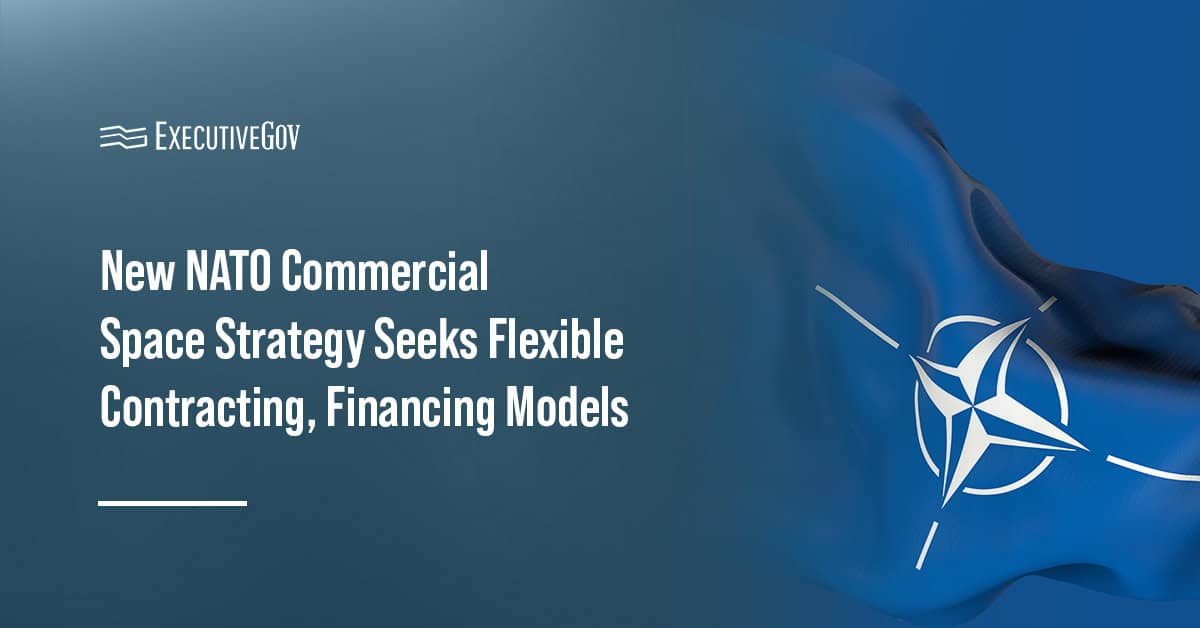NATO’s new Commercial Space Strategy is filled with provisions to make it easier for allied nations to do business with burgeoning space businesses and startups and tap their innovative capabilities.
The strategy document, released in June, encourages flexible contracting and financing to constantly refresh the pool of commercial providers and accommodate rapidly changing requirements. New contracting and financing models would benefit small and medium-sized companies and startups and take better advantage of commercial innovation.
The strategy also tackles financial and contractual risk management. NATO pledges to study how to better understand commercial challenges, evaluate existing support measures and make suggestions for possible additional mechanisms to slash risks to commercial space companies.
NATO also vows to leverage multinational space cooperation to reduce costs, bolster interoperability and interchangeability and create long-term relationships with the commercial space sector. Multinational cooperation opportunities are also scheduled for exploration to better address NATO and allied space capability requirements.
Learn more about flexible contracting and financing initiatives for commercial space companies at the Potomac Officers Club’s 2025 GovCon International Summit on October 16! Attend an informative keynote address by Maj. Gen. Devin Pepper, NATO deputy chief of staff for strategic plans and policy. Hear directly from Maj. Gen. Pepper about new business opportunities through improved space cooperation between allied nations. Secure your seat today for this elite GovCon conference!
Table of Contents
US Influence on the NATO Commercial Space Strategy
NATO’s Commercial Space Strategy highly resembles the Space Force Commercial Space Strategy that came out in 2024, according to Breaking Defense. Initiatives to develop a NATO Front Door gateway for commercial vendors and an allied version of the Space Force’s Commercial Integration Cell are similar to Space Force efforts.
The NATO strategy also anticipates organizational changes to military and civil staff structure. This has a goal of institutionalizing commercial integration practices, including developing a standards body to increase interoperability among allied space systems.
NATO allies pledge to better promote space priorities in allied education and training activities. NATO will mainstream collaboration with commercial space firms in exercises, demonstrations and trials and find more ways to leverage commercial participation.
Why Commercial Space?
Commercial space firms are developing innovative and cost-affordable technologies that allied militaries want to leverage. Satellite constellations, earth observation platforms and advanced sensors are being developed and upgraded at a much faster rate by private companies than the usual government acquisition cycles permit.
NATO also seeks to implement lessons learned from Russia’s invasion of Ukraine, which the alliance calls the first conflict to have commercial space technologies play a major role. Instead of duplicating efforts, NATO wants to acquire services directly from commercial providers early in the acquisition cycle, bringing these capabilities to NATO planning, exercises and operations.
What’s Next for NATO’s Commercial Space Strategy?
The RAND Corp. has multiple recommendations for NATO to advance its commercial space strategy. One is developing extensive partnerships and communication avenues with space companies. Learning from SPACENET, a NATO platform for connecting space firms, the alliance should persist in making its communications transparent and include small-, medium-sized and nontraditional companies. RAND calls them the foundation of allied defense interests.
RAND also suggests NATO’s industry engagement be “action-oriented” to develop ownership and trust. Initial conversations should envision opportunities to reduce regulatory burdens that slow acquisition timelines.
RAND encourages NATO to develop a model of project-based funding to support multinational capability cooperation efforts. Allied nations have small budgets for space, around 0.3 percent, according to RAND. Common funding is also not only difficult to disperse, but it can require a nation to “own” the start-up costs, even for joint programs.
Are you a GovCon space professional with an international portfolio? Be the first to learn about new requirements and solicitations at the Potomac Officers Club’s 2025 GovCon International Summit on October 16! Learn about the latest developments in space export control reforms directly from Maj. Gen. Devin Pepper, NATO deputy chief of staff for strategic plans and policy, during his keynote address. Sign up today to unlock new international space business opportunities!






